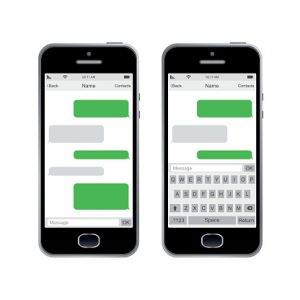Debunking Fake Text Messages Used as Evidence in Tennessee Divorce
 Cell phones have become so ubiquitous that almost everyone owns a mobile phone; smartphone users in particular seem to be attached at the hand to these little computers. The Pew Research Center for Internet, Science and Tech reports that a clear majority of Americans – 95% – now own a cellphone of some kind, and 77% of those are smartphones, which is up from 35% smart phone ownership in 2011.
Cell phones have become so ubiquitous that almost everyone owns a mobile phone; smartphone users in particular seem to be attached at the hand to these little computers. The Pew Research Center for Internet, Science and Tech reports that a clear majority of Americans – 95% – now own a cellphone of some kind, and 77% of those are smartphones, which is up from 35% smart phone ownership in 2011.
That is why, according to Family Lawyer Magazine, text messaging is the most common form of divorce evidence. The American Academy of Matrimonial Lawyers (AAML) reports that more than 90% of top lawyers in the U.S. have seen a spike in the number of cases using text messages as evidence in the past three years. When one spouse is accusing the other of infidelity or anything else, text messages can contain damaging information.
Using text messages as evidence can be tricky because it is so easy to create fake text messages that can be used to accuse the other party of foul deeds or to present a pattern of behavior that does not actually exist. The issue of authenticating text messages and other forms of electronic communication has become vitally important as a result.
A high-profile example of this occurred in the Johnny Depp and Amber Heard divorce, when Heard alleged to have received text messaged from Depp’s assistant, which spoke of Depp having remorse for having abused her. Depp’s assistant claims that he never sent those messages and that they were “doctored.” However, Heard, according to a story in People magazine, stands by her story. The magazine published a statement by a computer forensic consultant who says that he authenticated the time stamps on the exchange of text messages and that none of the contents had been altered. The consultant looked at Ms. Heard’s iPhone backups and the device containing the backups and concluded that the backups are authentic.
Methods for authenticating text messages
Text messages can be printed so that the whole chain of messages between the parties can be examined in context, but simply printing them does not prove that they are genuine when anyone can download an app where you can create text message conversations complete with date and time stamp. Some methods for authenticating text messages include:
- One party admitting that the messages are genuine, or someone who witnessed the messages being sent corroborating the story.
- A method known as “reply-authentication” makes a message authentic because it is in response to the previous message.
- Subpoenaing the text message logs from the cell phone service provider.
- The text message or email evidence being excluded on the grounds of prejudice, confusion or a waste of time pursuant to the Tennessee Rules of Evidence.
If you are embroiled in a nasty divorce and the other side has manufactured text messages or emails and is trying to use them against you, it is fairly easy to prove that they are fake. If you are using text messages or emails as evidence against the opposing side, make sure that they can be authenticated as genuine, and that you have other evidence to back up your allegations.
Has your spouse tried to use fake text messages as evidence against you? The shrewd divorce attorneys at the law firm of Miller Upshaw Family Law, PLLC, are here to protect your interests and make sure that you get the best outcome possible in your divorce. We work hard to relieve your stress by taking on the legal burden during divorce and other family law disputes in the Nashville area. We encourage you to call us today at 615-391-4200 or contact us to reserve an in-person or video consultation with an experienced Nashville divorce lawyer.

Karla C. Miller has devoted her entire career to the practice of family law in Tennessee. She attended Auburn University and Nashville School of Law, and upon graduation in 1996, she opened her own law firm and has been assisting families throughout Tennessee since then. Learn more about Karla C. Miller here.
